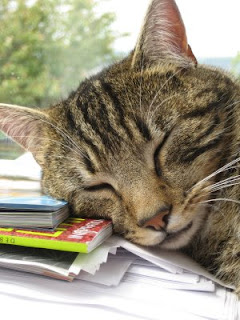Table Of Cat Vaccinations
Vaccinations >>>>>>>>When to administer (age)
First feline panleukopenia (FPL),
Feline viral rhinotracheitis (FVR), >>> 8-9 weeks
(all three components given in one shot) >>> 12 weeks
· Booster shot of above
Feline leukemia virus (FeLV)
(to be administrated after the booster, >>>> 12 weeks
only if needed)
Rabies shot ( if needed) >>>>>>>>16 weeks
· Booster shot >>>>>>>>>1 year
· Rabies
Rabies vaccinations are required by law. The first rabies vaccination is good for one year. In many states subsequent vaccinations are good for three years. In other states, they are only valid for one year by law. Please check with your vet to determine the legal requirements in your state. Vaccinating your pet for rabies may literally save its life for two reasons. Rabies is a threat in many areas and it is a horrible disease. In addition, an unvaccinated pet who bites a human being, even by accident, is subject to long quarantine periods or even death for the purpose of testing for rabies infection.
· Panleukopenia
Panleukopenia is the cat disease most often referred to as "distemper". It is a deadly disease. Fortunately, it is not a very common disease as vaccination against it appears to be very successful. Kittens require a series of vaccinations every 3 to 4 weeks from the time vaccinations start until they are approximately 16 weeks old. Since this virus does not always require direct contact for transmission, it is generally included in the series of recommended vaccinations for all cats.
· Rhinotracheitis
Rhinotracheitis is caused by a herpes virus. It causes respiratory disease in its acute phase. Chronically, it can be the cause of persistant eye irritation and corneal disease. Due to the potentially chronic nature of this disease it is also usually recommended for most cats. It appears that the protection against this disease from vaccination is of relatively short duration and yearly boosters seem to be a necessity.
· Calicivirus
This virus also causes respiratory disease in its acute phase. It also can become chronic. Affected cats may have persistant gum disease or chronically recurring upper respiratory disease. This vaccine is recommended for most cats.
· Feline Leukemia
Feline leukemia virus (FeLV) requires direct contact with an infected cat in order to spread. For this reason, it may not be necessary for cats confined to the home. This vaccine should be administered to cats who live full-time or part-time outdoors.
· Feline Infectious Peritonitis
There are very few instances in which the use of this vaccine is warranted. There is a great deal of question about how well this vaccine works.
Source : http://www.geocities.com/feliscatus_my/index.html







0 comments:
Post a Comment